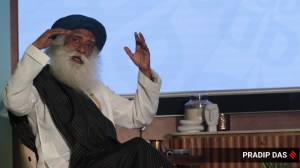How good are Israel’s tents?
Ma tovu ohalecha ya’akov meeshkenotecha yisrael (How good thy tents are, O Jacob, thy dwelling places, O Israel)...

Ma tovu ohalecha ya’akov meeshkenotecha yisrael (How good thy tents are, O Jacob, thy dwelling places, O Israel) — the first verse of the prayer that opens every synagogue service in the morning was originally uttered not by the Hebrews but by Balaam, the “heathen” prophet hired by the Moabite king to curse the Israelites.
Soon after the first Zionist Congress at Basel (1897) called for a homeland in Palestine/EretzIsrael for the Jews, many came to envision a “land without people for a people without a land” (just the way it was for America, with all the implied irony). When Theodore Herzl asked Max Nordau to describe the Zionist goal in one sentence, Nordau came up with a Jewish homeland in the land of Israel, secured through international legitimacy — that is, the idea of the Jews as a nation, a state for the Jews (and not for everybody), in the ancient land of Israel, but without implying the whole of it, and guaranteed by international legitimacy.
The declaration of Israel’s independence on May 14, 1948, in the immediate aftermath of the Holocaust, was a victory of life over death. But Israel, at 60, continues to live under an international curse and has not yet managed to make its declared enemies and many others utter a blessing in its favour. (This year, on the eve of Holocaust Remembrance Day, about 100 British anti-Zionist Jews published a statement in The Guardian stating their case against Israel, most prominent among them being Harold Pinter.)
Many in Israel don’t seem to be too enthusiastic about the celebrations for the 60th anniversary of independence (May 8 this year according to the Jewish calendar), and columnists are discussing the paralysis born of a tiredness that appears to be the one shared characteristic across an Israel long divided into religious vs secular, settler vs cavalier, hawk vs dove, Ashkenazim vs Sephardim, Jew vs Arab. After a miraculous survival for six decades, Israel is taking stock.
Yet, remembering Mrs Lot, Israel is afraid to look back. Forty-one years ago, till June 5, 1967, Israel was a small, nervous Jewish entity surrounded by Arab governments and armies screaming into Jewish homes over the radio. The annihilation of Israel was only a matter of time. Well, history chose, over the next six days, to vanquish the Arab military in a blitzkrieg that brought Israel territory beyond what the 1948 UN resolution allowed and established its dominance in the region. But that euphoria would turn, over the next four decades, into a renewed fear psychosis and despair. And the recognition that the ancient homeland has become one of the least safe places for Jews.
At 60, a lot of things are going right for Israel — its economy is booming and Israelis have never been more prosperous, it is a big high-tech success story, and it is beginning to extract a cultural confidence from rediscovering Jewish identity and history. And yet, secular Israelis continue to migrate for reasons of security or opportunity, darkly hinting at Philip Roth’s rather Jewish joke of a “Moses in reverse”, in Operation Shylock, leading the Jews out of an unsafe Israel into a safer Europe!
More importantly, the peace talks are in limbo and George W. Bush doesn’t realise — in his insistence on praising Mahmoud Abbas and pushing for renewed talks with Fatah — that Abbas and Fatah are dead for all practical purposes. The secular Fatah is being radicalised and the day may not be far off when the Fatah moderates are purged and an Islamist Fatah merged with Hamas. As the possibility of a two-state solution recedes, Israel could be staring at the untenable prospect of a single state that houses both Jews and Arabs.
It is not just that the West Bank and Gaza constitute a humanitarian disaster of mammoth proportions, but also the danger of demographics overwhelming and sinking Israel. If Israel doesn’t let go of the West Bank, it will soon be a Jewish state with an Arab majority and then, would one be looking at another South Africa? A one-state solution would anyway mean the dissolution of Israel, something that it cannot allow. Those opposed to a Palestinian state ignore this demographic threat. Of course, the utopian dream of Jews and Arabs living in harmony in one state is just that — a utopia, despite the relative prosperity of Arab Israelis.
Thus is it also imperative for Israel, a matured democracy at 60, with its prime minister on the verge of indictment for corruption, with one of the finest militaries in the world, to talk to Hamas. It is an axiom of asymmetric warfare that the weaker party holds an advantage disproportionate to its weapons. Hamas will never win, but its rocket fire won’t cease either. If the talks fail (as they might), there is nothing to lose because then Israel can go back to blockading Gaza and pounding Hamas. But if the talks succeed, there is everything to gain — peace, even if momentary. Peace for Shderot and Ashkelon. Peace for Israelis who live in perpetual terror of suicide attacks and Qasam rockets and for Palestinians who continue to suffer perpetual destitution and humiliation. And it isn’t as if Israel hasn’t had a line of communication with Hamas all this time.
There will perhaps never be any solution to West Asia’s fundamental crisis because it is old and elementary — two peoples fighting for the same piece of land for a hundred years in the present episode. A solution would require Israel to bury the claims of collective memory and emotion and pull out of the West Bank. And Hamas and its Syrian and Iranian backers to let Israel live in peace, without loud declamations of death to the Jewish state. But, in the leadership crisis of Israelis and Arabs, the lack of consensus and political will, everybody is too tired to listen.
sudeep.paul@expressindia.com
Photos


- 01
- 02
- 03
- 04
- 05





























